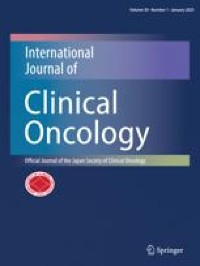Abstract
Purpose
Great individual differences were observed regarding the efficacy of apatinib clinically. The aim of present study was to investigate the influence of vascular endothelial growth factor receptor2 (VEGFR2) gene polymorphism on the clinical outcomes of apatinib for patients with chemotherapy–refractory extensive-stage small cell lung cancer (ES-SCLC).
Methods
A total of 128 patients with chemotherapy–refractory ES-SCLC who were treated with apatinib at an initial dosage of 250 or 500 mg were included in this study. The change of target lesions was assessed. Overall response rate (ORR) was evaluated. Prognosis was carried out and safety profile was documented. Additionally, peripheral blood and biopsy cancer tissue specimens of the patients with SCLC were collected for the analysis of polymorphism and VEGFR2 gene mRNA expression, respectively. The association between genotype status and baseline characteristics was performed. Univariate analysis of genotype status and prognosis was carried out using Kaplan–Meier survival analysis and multivariate analysis were adjusted by Cox regression analysis.
Results
Efficacy of apatinib included partial response (PR) in 15 patients, stable disease (SD) in 86 patients, progressive disease (PD) in 27 patients. Therefore, ORR of the 128 patients with ES-SCLC was 11.7%, and disease control rate (DCR) was 78.9%. Prognosis suggested that the median progression-free survival (PFS) and overall survival (OS) of the 128 patients with ES-SCLC was 4.2 months and 8.2 months, respectively. The polymorphism analysis focusing on VEGFR2 gene indicated that one single nucleotide polymorphism 889C>T was of clinical significance. Prevalence of 889C>T among the 128 patients with SCLC were as follows: CC genotype 87 cases (68.0%), CT genotype 38 cases (29.7%) and TT genotype 3 cases (2.3%), the minor allele frequency of 889C>T was 0.17, which was in accordance with Hardy–Weinberg Equilibrium (P = 0.628). Patients with CT and TT genotypes were merged in the subsequent analysis. Prognosis analysis exhibi ted that the median PFS of patients with CT/TT genotype and CC genotype was 3.3 and 5.0 months, respectively (P = 0.02). Furthermore, the median OS of patients was 5.5 and 9.0 months, respectively (P = 0.008). Additionally, multivariate Cox regression analysis of OS demonstrated that CT/TT genotype was an independent factor for OS [Hazard ratio (HR) = 0.64, P = 0.019]. However, the safety profile according to genotype status of 889C>T failed to show significant difference. Interestingly, mRNA expression analysis suggested that the mRNA expression of VEGFR2 in cancer tissues were significantly different according to CC and CT/TT genotypes (P < 0.001).
Conclusion
The administration with apatinib for patients with chemotherapy–refractory ES-SCLC was of potential clinical significance. The clinical outcomes of patients with ES-SCLC who were treated with apatinib could be impacted by VEGFR2 889C>T polymorphism through mediating the VEGFR2 mRNA expression.



Δεν υπάρχουν σχόλια:
Δημοσίευση σχολίου
Σημείωση: Μόνο ένα μέλος αυτού του ιστολογίου μπορεί να αναρτήσει σχόλιο.